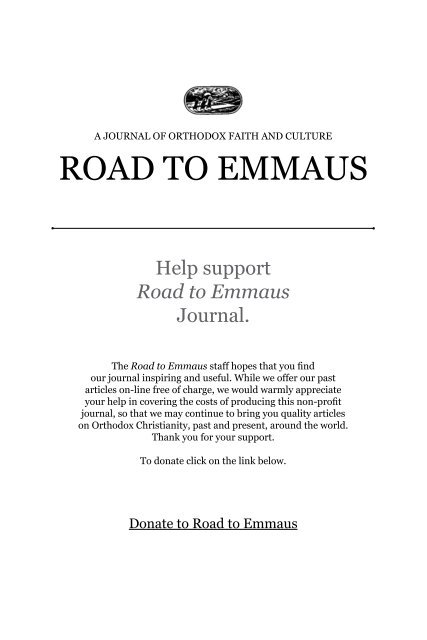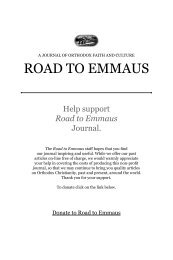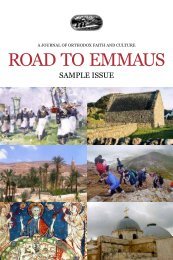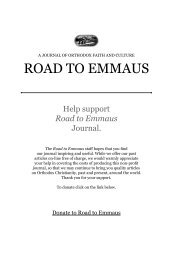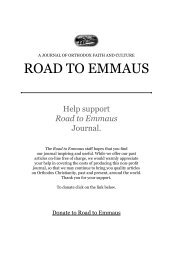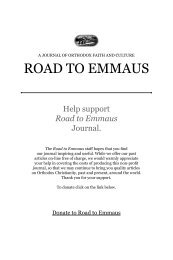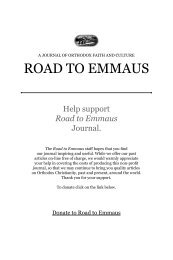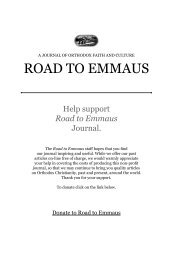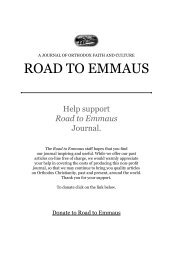Banished Faith: The Exile of Christian Pontus - Road to Emmaus ...
Banished Faith: The Exile of Christian Pontus - Road to Emmaus ...
Banished Faith: The Exile of Christian Pontus - Road to Emmaus ...
You also want an ePaper? Increase the reach of your titles
YUMPU automatically turns print PDFs into web optimized ePapers that Google loves.
BANISHED FAITH:THE EXILE OFCHRISTIANPONTUSby George Andreadis<strong>The</strong> Greek <strong>Christian</strong> Emigration <strong>to</strong> Russian KarsPart II <strong>of</strong> <strong>The</strong> Cryp<strong>to</strong>-<strong>Christian</strong>s <strong>of</strong> <strong>Pontus</strong> concludes the remarkable narrative <strong>of</strong> over 300years <strong>of</strong> secret <strong>Christian</strong>ity under the Ot<strong>to</strong>mans, and the 20th-century revelation, persecution,and exile <strong>of</strong> the Greek Orthodox <strong>of</strong> the Black Sea coast.Under the 1856 Ot<strong>to</strong>man Hatti Humayun decree, citizens <strong>of</strong> theOt<strong>to</strong>man Empire were granted freedom <strong>of</strong> belief and the right <strong>to</strong>change their religion, allowing tens <strong>of</strong> thousands <strong>of</strong> cryp<strong>to</strong>-<strong>Christian</strong>s,whose families had appeared outwardly Muslim for centuries, <strong>to</strong> openlypr<strong>of</strong>ess their faith. Churches, schools, and charitable foundations sprang up<strong>to</strong> minister <strong>to</strong> the growing population <strong>of</strong> newly-revealed <strong>Christian</strong>s, but theflowering was not <strong>to</strong> last. World War I, the dissolution <strong>of</strong> the Ot<strong>to</strong>manEmpire, and Turkish nationalism would culminate in the 1923 Exchange <strong>of</strong>Populations that displaced the 3,000-year-old Greek culture <strong>of</strong> Asia Minor.When the Russo-Turkish war <strong>of</strong> 1877-1878 was concluded by the Treaty<strong>of</strong> San Stefano and the Armenian region <strong>of</strong> Kars transferred from Ot<strong>to</strong>man<strong>to</strong> Russian control, Tsar Alexander II created Karskaya Oblast, a secure areafor the Ot<strong>to</strong>man Empire’s beleaguered <strong>Christian</strong>s. <strong>The</strong> region’s high elevationwas good for animal breeding, and gold and silver had already beenfound. Insisting on a balanced population <strong>of</strong> Muslims and non-Muslims,Anna Phostiropolou.Pho<strong>to</strong>s in <strong>Banished</strong> <strong>Faith</strong> and Return <strong>to</strong> Kromni, courtesy <strong>of</strong> George Andreadis.3
<strong>Road</strong> <strong>to</strong> <strong>Emmaus</strong> Vol. IX, No. 1 (#32)BANISHED FAITHthe tsar invited Armenians and Greeks <strong>to</strong> emigrate <strong>to</strong> the newly-held terri<strong>to</strong>ry,replacing thousands <strong>of</strong> Muslims who were returning <strong>to</strong> Turkey. Anumber <strong>of</strong> Russians also settled in Kars: army troops, public administra<strong>to</strong>rs,school teachers, and merchants. Many Greeks, particularly formercryp<strong>to</strong>-<strong>Christian</strong>s, accepted the tsar’s invitation.Under the Russian administration, churches and schools were built, andpan-Slavism became so prevalent that, within a generation, young Greekswere speaking Russian in lieu <strong>of</strong> Greek from attending Russian schools.<strong>The</strong>re were 79 Greek villages in the Kars region, and the capital city wascrowned by the Greek Orthodox Cathedral <strong>of</strong> the Transfiguration(Metamorphosi), <strong>to</strong> which Tsar Nicholas II donated a bell weighing 3,200kilos (over 7,000 lbs.) with a rich <strong>to</strong>ne that could be heard for many miles.<strong>The</strong> Kars refuge lasted until the Russian troop withdrawal <strong>of</strong> 1918, and in1921, eager <strong>to</strong> regain their lost terri<strong>to</strong>ries, Turkey quickly came <strong>to</strong> termswith the young revolutionary Russian government. Lenin returned theregion <strong>to</strong> Turkey as part <strong>of</strong> the settlement <strong>of</strong> the Treaty <strong>of</strong> Kars, saying, “<strong>The</strong>Greeks are servants <strong>of</strong> imperialism in Asia Minor, and Mustafa Kemal[Ataturk] is our future friend and collabora<strong>to</strong>r.”For the most part, those Black Sea <strong>Christian</strong>s who chose <strong>to</strong> remain in<strong>Pontus</strong> co-existed peacefully with their Muslim neighbors. Living side byside in small villages, political or religious friction that would upset the balance<strong>of</strong> village life was discouraged. A single trac<strong>to</strong>r or cultiva<strong>to</strong>r <strong>of</strong>tenserved the entire village, both Greek and Muslim fields; where neighborswere dependant on one another, it was difficult <strong>to</strong> create lasting enmity.Later religious tensions and mistreatment <strong>of</strong> <strong>Christian</strong>s were rarely initiatedlocally, but by regional or national governors, militant Turkish nationalists,or roving bands <strong>of</strong> thugs, while local Muslims <strong>of</strong>ten attempted <strong>to</strong> curtailthe intimidation and violence.Metropolitan Gervasios SoumelidesOne well-known Kromnian <strong>of</strong> this period after the revelation <strong>of</strong> the cryp<strong>to</strong>-<strong>Christian</strong>s was Gervasios Soumelides, born in 1820 <strong>to</strong> a family <strong>of</strong> pr<strong>of</strong>essed<strong>Christian</strong>s in Varenou, the village where my ances<strong>to</strong>r, Mullah Molasleyman,simultaneously served as both the local mullah and the cryp<strong>to</strong>-<strong>Christian</strong>priest. Until 1836, Gervasios worked as a s<strong>to</strong>ne-carver in the mines <strong>of</strong> Ala Dagin Cilicia, but after permanently injuring his leg, he returned <strong>to</strong> <strong>Pontus</strong> andbecame a monk at the monastery <strong>of</strong> Panagia Soumela. He later attended the<strong>The</strong>ological School in Halki, served in Constantinople, and in 1864 becameMetropolitan <strong>of</strong> Chaldia, eight years after the Hatti Humayun allowed thecryp<strong>to</strong>-<strong>Christian</strong>s <strong>to</strong> reveal their <strong>Christian</strong>ity.As metropolitan, he helped fill the Kromni area with churches and schools,and out <strong>of</strong> his own salary paid for more than forty-five young men <strong>to</strong> study inFrench and German universities. <strong>The</strong>y became doc<strong>to</strong>rs, lawyers, and engineers.He also <strong>to</strong>ok up the cause <strong>of</strong> women’s education, complaining<strong>to</strong> the local assembly, “We increase the number <strong>of</strong>scholars and scientists, but there is no education for thegirls. <strong>The</strong>y must study also.” <strong>The</strong> men objected, “Butwho will marry my daughter if she is educated?” Inresponse, the metropolitan instituted a school fororphan girls, <strong>to</strong> which no one could object, and fromthere, women’s education spread. My maternal grandmother,Parthena Orologa, and her brother Gervasioswere small children when their parents died, and bothlived at the orphanage. My grandmother became a teacherand was later direc<strong>to</strong>r <strong>of</strong> the Girl’s School <strong>of</strong> Argyroupolis(now Gümüshane), and her brother became bishop <strong>of</strong>Caesarea. He was afterwards transferred <strong>to</strong> Korca inAlbania, and finally <strong>to</strong> Ioannina in northern Greece where, in 1914, during hisepiscopacy, the Greek army marched in and Ioannina was freed from fourcenturies <strong>of</strong> Ot<strong>to</strong>man rule. Thanks <strong>to</strong> Metropolitan Gervasios, all <strong>of</strong> the men<strong>of</strong> my mother’s family received a good education.Uncle Epaminondas and Faruk <strong>of</strong> ArgyroupolisMetropolitan <strong>of</strong>Chaldia, GervasiosSoumelides, <strong>of</strong>Kromnian descent.<strong>The</strong>re is an amusing s<strong>to</strong>ry from this time, <strong>to</strong>ld years later by my mother’sbrother, Epaminondas Sotiriadis, who, as a youth in 1903-4, was summonedfrom Gümüshane <strong>to</strong> Ioannina <strong>to</strong> study near his uncle, this same bishop <strong>of</strong>Ioannina. He made the journey from Trebizond <strong>to</strong> Constantinople, and fromConstantinople by Italian freighter <strong>to</strong> the port <strong>of</strong> Agioi Saranda (nowAlbania). <strong>The</strong> last leg <strong>of</strong> his journey was by Austrian post carriage travelingfrom Agioi Saranda <strong>to</strong> Ioannina with the mail. High in the mountains theys<strong>to</strong>pped at a village inn. Shocked, he wrote home, “Imagine the poverty!Here I have seen my own Greek people cooking eggs with olive oil!” This was45
<strong>Road</strong> <strong>to</strong> <strong>Emmaus</strong> Vol. IX, No. 1 (#32)because the good grazing lands near the Black Sea supported many cows,and everyone ate butter.Later, my uncle studied law at the University <strong>of</strong> Istanbul, where he shareda room with a Muslim medical student named Faruk. This did not presenta problem because Faruk was from Argyroupolis, near Kromni, and theirrelations, like that <strong>of</strong> their families, was that <strong>of</strong> brothers.When the Russian army occupied Trebizond and Argyroupolis in 1916,the Turks panicked at rumors that there were many Armenians serving inthe Russian army who thirsted for revenge after the Armenian massacres <strong>of</strong>the previous year. <strong>The</strong> wealthy Turks, and evenpoorer Turkish men, left in a panic, closing andsealing their homes and giving the keys <strong>to</strong> theirGreek friends and neighbors. Faruk’s family waswell-<strong>of</strong>f, and they also sealed their home and gavethe keys <strong>to</strong> my grandfather, Sotiris Sotiriadis. <strong>The</strong>evil period passed, but many <strong>of</strong> the Turks were notable <strong>to</strong> return for several years, and <strong>to</strong>wards theend <strong>of</strong> 1922, when the Greeks were finally <strong>to</strong>ld <strong>to</strong>leave Argyroupolis at the Exchange <strong>of</strong>Populations, my relatives opened Faruk’s home,Epaminondas Sotiriadis. put all <strong>of</strong> his carpets, valuables, and everythingelse they could carry (except his library) in<strong>to</strong> carts and <strong>to</strong>ok them withthem, leaving a note that they would be in Batum, Georgia.In 1923, the Turks occupied Batum for a short period, and Faruk was sentthere as a military doc<strong>to</strong>r with the Turkish army. Faruk and my family metagain with great pleasure. He <strong>to</strong>ld them that thieves had broken in<strong>to</strong> his familyhome in Argyroupolis and had s<strong>to</strong>len everything that was left, even hismedical diploma. His family valuables and furniture, though, had been keptsafe for him in Batum and in 1938, Faruk wrote <strong>to</strong> tell us that by a strangecoincidence he had found his medical diploma for sale in an antique shop inIstanbul! Sadly, before the Second World War, we lost all trace <strong>of</strong> each other.World War I:Persecution <strong>of</strong> Armenian and Black Sea Greek <strong>Christian</strong>sIn 1914, when Turkey entered World War I on the side <strong>of</strong> Germany, thegovernment ordered a general mobilization <strong>of</strong> all able-bodied Turkish menCharalampos and Irene Mouzidou.6
BANISHED FAITHfrom age 15 <strong>to</strong> 50. <strong>The</strong> rule <strong>of</strong> Ot<strong>to</strong>man centuries held that <strong>Christian</strong>s couldnot bear arms, and they were relegated instead <strong>to</strong> unarmed “labor battalions,”that broke s<strong>to</strong>nes and built roads under such dismal conditions thatfew returned alive. 1 Many emigrated <strong>to</strong> Russia and Georgia <strong>to</strong> avoid conscription.Those who deserted the forced-labor gangs were unable <strong>to</strong> returnhome without endangering their families and villages, and so <strong>of</strong>ten joinedpartisan bands hiding in the mountains. As the war dragged on, the sultan’spower weakened daily, with Mustafa Kemal Ataturk, the Young Turks, andvarious nationalist groups waiting in the wings <strong>to</strong> <strong>to</strong>pple the Ot<strong>to</strong>mandynasty. Bands <strong>of</strong> Turkish bandits and ex<strong>to</strong>rtioners arose, and using themobilization law as a weapon, they threatened <strong>Christian</strong> villages, whosemen had not yet served in the army, with exposure and imprisonmentunless they paid heavy bribes.One such thug was Topal Osman 2 , a Turk from Gerasus, who organizedthe tseteler, gangs <strong>of</strong> armed bandits who plundered and burnt <strong>Christian</strong>homes and villages along the Black Sea coast for over a decade. After an initialappointment <strong>to</strong> the National Assembly when the Young Turks came <strong>to</strong>power, Osman was hung for participating in a failed conspiracy againstAtaturk, but in the years preceding his death, he and his men were thescourge <strong>of</strong> <strong>Pontus</strong>’ <strong>Christian</strong>s. In the village <strong>of</strong> Khabak, the tseteler <strong>to</strong>okmoney from the Greeks “<strong>to</strong> keep their sons out <strong>of</strong> prison,” and then massacredthe entire <strong>Christian</strong> population. In Havza, they put the villagers insidethe village church and burnt them alive. Only on the eastern end <strong>of</strong> theTurkish Black Sea coast were the <strong>Christian</strong>s protected, as we shall see later,through the policies <strong>of</strong> Bishop Chrysanthos <strong>of</strong> Trebizond.Massacres and forced marches <strong>of</strong> Armenian, Syriac and Orthodox<strong>Christian</strong>s in and near Turkey had been initiated in the previous century,but for the Pontians, persecution <strong>of</strong> the Armenians was felt only in 1915,when local Armenians were targeted. <strong>The</strong> Pontian Greeks’ own Golgothabegan in February <strong>of</strong> 1916, when allied imperial Russian troops occupied theeastern Black Sea coast during World War I, and the Ot<strong>to</strong>man government,fearing collaboration with the tsarist forces, wreaked retribution onTurkey’s native Greeks. Until the final displacement <strong>of</strong> the Greeks in 1923,however, even the harshest government policy could not eradicate the ties1 For centuries previously, <strong>Christian</strong>s under the Ot<strong>to</strong>mans were not allowed <strong>to</strong> do military duty, but wereinstead assessed heavy additional taxes <strong>to</strong> equip the empire’s all-Muslim army.Domna Koykalidou.2 Topal Osman: Feridun Zade Osman Aga, nicknamed “Topal,” meaning, “the cripple.”9
<strong>Road</strong> <strong>to</strong> <strong>Emmaus</strong> Vol. IX, No. 1 (#32)BANISHED FAITHthat many Pontic <strong>Christian</strong> and Muslim villagers had maintained for centuries.Neighbors remained neighbors until the end.Parthena EleftheriadouAt 80 years <strong>of</strong> age, native Kromnian Parthena (Telidis) Eleftheriadou, thedaughter <strong>of</strong> George and Maria Telidis, spoke freely <strong>of</strong> her childhood memories<strong>of</strong> Turkish neighbors in Trebizond when she returned <strong>to</strong> Kromni fromGreece on a group pilgrimage in 1988. Recalling the spirited Trebizond celebration<strong>of</strong> <strong>The</strong>ophany, she said, “In our neighborhood <strong>of</strong> Exotiha, we hadno differences with the Turkish children. Of course, they were not supposed<strong>to</strong> participate at the Cross festival, but all year long we played <strong>to</strong>getherbecause we were from the same neighborhood. We also played at throwings<strong>to</strong>nes – mainly the boys, but I was also a bit like a boy and I also threws<strong>to</strong>nes. But we were all <strong>to</strong>gether, Greeks and Turks from the same neighborhood,and our s<strong>to</strong>nes were thrown at other children, Greeks and Turks<strong>of</strong> another neighborhood.”Parthena also recalled her mother’s arrest after helping an Armenian duringthe period <strong>of</strong> Armenian persecution by the Turks:In May <strong>of</strong> 1915, most <strong>of</strong> the women and children went <strong>to</strong> Russion,our village in Kromni, for the summer. <strong>The</strong> men stayed in Trebizond <strong>to</strong>work and could only join us in August. After our arrival, the Turksaccused the Armenian <strong>Christian</strong>s <strong>of</strong> preparing for revolution and beganrounding them up, closing the roads and forbidding all transport, <strong>to</strong>make their capture easier. But this also meant that we could not getfood or supplies, and as the weeks went by, the women began <strong>to</strong> worry.We rationed food, until finally we were living only on bread. My motherwas sitting in our garden one day, thinking how <strong>to</strong> obtain more flour,when a beggar approached with very dirty clothes, saying, Bir az ekmekistiyoru. “Just give me a small piece <strong>of</strong> bread.” He was an Armenianhiding in the mountains <strong>of</strong> Kromni, whom hunger and the smell <strong>of</strong> freshbread had driven <strong>to</strong> our door. Mother thought that he certainly wouldnot be alone, and gave him three <strong>of</strong> our five newly baked loaves.Someone in the village saw her, however, and reported her <strong>to</strong> thepolice. This was a serious <strong>of</strong>fense, as a proclamation had been postedand read aloud that anyone assisting or giving food <strong>to</strong> an Armenianwould be punished by death.My mother was taken <strong>to</strong> the court in Adassa, where the judgedemanded <strong>to</strong> know why she had helped the Armenian. Her deathseemed certain. But my mother was clever: “Your Honor, I did not knowthat the beggar was an Armenian. Even if it was written on his foreheadthat he was an Armenian, I wouldn’t know, because I can’t read orwrite.” After a lecture against helping bad people, the judge set her free.Others were not so fortunate. One prominent Greek <strong>of</strong> Trebizond, AchillesLazaridis, hid an Armenian friend, Agop, in his cellar and <strong>to</strong>ld him not <strong>to</strong>leave. Agop, however, believed the lies the Turks spread that any Armenianturning himself in would be sent back <strong>to</strong> Greater Armenia, and when he didso, he was not only captured and executed, but Achilles as well. When S<strong>of</strong>iaLazaridou opened her door the next morning, she found her husband’s headand dismembered body in a sack on her doorstep.Parthena Eleftheriadou continues:For us in Kromni, the weeks went by, but the roads remained closed.In Russion, we gathered all the flour from every house and made breadfor the whole village. <strong>The</strong> situation was serious because autumn wasapproaching and soon there would be snow in the mountains.Near Russion was a village called Molali, which was all Muslim, butwe did not feel them <strong>to</strong> be strangers, nor did they feel us so. We werecompatriots and the Pontian dialect was also their mother <strong>to</strong>ngue. Oneday the elder women <strong>of</strong> Molali came <strong>to</strong> discuss with our elder womenwhat was <strong>to</strong> be done. <strong>The</strong> Molali women proposed that the women andchildren <strong>of</strong> both villages go down <strong>to</strong> Trebizond <strong>to</strong>gether by back roads.At that time there were many thieves and resistance fighters in thosemountains, as the political disturbances enabled them <strong>to</strong> prosper, butthe women <strong>of</strong> Molali thought that if both villages went <strong>to</strong>gether, if wewere set upon by <strong>Christian</strong> robbers, we could protect the Muslim neighbors,and if there were Muslim robbers, the women <strong>of</strong> Molali could protectus. <strong>The</strong> proposal was logical and it was agreed upon.<strong>The</strong> two villages collected what supplies they still had and set ou<strong>to</strong>n the 130 kilometer trek. <strong>The</strong> first night we slept out under the openskies. <strong>The</strong> next day most <strong>of</strong> our way was green and heavily forested,but the last part was somewhat open and barren. We hurried <strong>to</strong> reachthe next forested area, but suddenly someone jumped out at us with agun, shouting loudly in Turkish, “Dur!” that is, “S<strong>to</strong>p”. My mother was1011
<strong>Road</strong> <strong>to</strong> <strong>Emmaus</strong> Vol. IX, No. 1 (#32)the one who had the courage <strong>to</strong> face him, and, as I was used <strong>to</strong> holdingon<strong>to</strong> her dress and following in her steps, I went along as well.As we approached the gunman, my mother recognized him, a<strong>Christian</strong>. It was one <strong>of</strong> the commanders <strong>of</strong> the Greek resistance inSanta. 3 “Eukleidis, isn’t it?” she asked. “Silence!” said Captain Eukleidis.“Go back and tell them that we are Turks and that you are <strong>to</strong> give us half<strong>of</strong> your supplies, so that we can survive as well.” Mother returned andsaid that he was a Turk and wanted half <strong>of</strong> the supplies. <strong>The</strong>se were simple,honest women, and <strong>to</strong> save their lives, they agreed and gave half <strong>of</strong>the food. <strong>The</strong> robbers collected it, and then left us free <strong>to</strong> go on our way<strong>to</strong> Trebizond, but the women <strong>of</strong> Molali were unsatisfied. <strong>The</strong> eldest <strong>of</strong>them finally turned <strong>to</strong> my mother and said, “Telava, those were notTurks. Those were Rums (<strong>Christian</strong>s). If they were Turks, they wouldn’thave asked for half, but would have taken everything.”Metropolitan Chrysanthos and Russian-Occupied TrebizondWhen the Russian army occupied Trebizond in 1916 as part <strong>of</strong> the Alliedforces <strong>of</strong> World War I, there was a strong desire in the Greek community <strong>to</strong>rebuild the city as a Greek <strong>Christian</strong>stronghold and, in particular, <strong>to</strong> reclaimthe his<strong>to</strong>ric Church <strong>of</strong> St. Eugenios, 4Russian <strong>of</strong>ficers with MetropolitanChrysanthos <strong>of</strong> Trebizond.dedicated <strong>to</strong> the city’s patron saint,which had been used as the Yeni Cumamosque for centuries. MetropolitanChrysanthos Philippides, the leader <strong>of</strong>Trebizond’s <strong>Christian</strong>s, held back theeager young Greeks who wanted <strong>to</strong> forcechange by confiscating Turkish proper-3 <strong>The</strong> seven villages making up the famous district <strong>of</strong> Santa refused <strong>to</strong> surrender, even when surrounded byarmed Turkish troops. When it was clear that a special detachment had been sent <strong>to</strong> move them, 800 womenand children escaped <strong>to</strong> the mountains. Those remaining in the villages were marched on foot <strong>to</strong> the desertnear the Syrian border where most died <strong>of</strong> thirst. <strong>The</strong> women and children and the partisans guarding themresisted until the Exchange <strong>of</strong> Populations, and left their mountain stronghold for Greece only once theywere given international guarantees <strong>of</strong> safety.4 St. Eugenios <strong>of</strong> Trebizond: A martyr under Diocletian, his relics were uncovered by Alexius Comnenus(1204-1222), Emperor <strong>of</strong> Trebizond and grandson <strong>of</strong> Byzantine Emperor Andronicus I and great-greatgrandson <strong>of</strong> King David the Builder <strong>of</strong> Georgia. Alexius declared St. Eugenios the patron <strong>of</strong> both Trebizondand the Comnenan dynasty. <strong>The</strong> skull was enshrined with jewels and his other relics were en<strong>to</strong>mbed undermarble in the front <strong>of</strong> the church. Both disappeared in the following centuries.Eleni Vafeadou with her grandaughter, Sophia.12
BANISHED FAITHty. Perhaps recalling the Russian withdrawal <strong>of</strong> 1828 and knowing that theregion might again revert <strong>to</strong> Turkish rule, the hierarch insisted, “No, waituntil the end <strong>of</strong> the war.”Understandably, the poor Muslim Turks left behind in Trebizond wereafraid. Even if they were good people – and many were – the Russian occupierswere accompanied by an influx <strong>of</strong> Armenians just months after the 1915Armenian genocide. What Armenian, thirsting for revenge, would believe theTurk who said, “I am a good man?” So the rich Turks <strong>to</strong>ok their families andmoved west, while among the poor, only the men left Trebizond. Ten thousandlower-class Turkish women and children were left behind.In 1916, there were only three Greek schools <strong>of</strong> higher learning in Turkey,“<strong>The</strong> School <strong>of</strong> the Nation” in Istanbul, “<strong>The</strong> Evangelismos (Annunciation)School” in Smyrna (Izmir) and in Trebizond, the so-called “Frontestirio.”<strong>The</strong> first public grammar school in Turkey was established during theRussian occupation by Metropolitan Chrysanthos for these poor Turkishchildren who had been left behind in Trebizond.He also set up a public kitchen <strong>to</strong> feed the Moslem families and <strong>to</strong> providethem with clothes and bedding. In his memoirs, he wrote, “I learned thenhow difficult it was <strong>to</strong> organize the Turks….” <strong>The</strong> Greeks had a strong communitylife, and if, for instance, the Turkish tax collec<strong>to</strong>r came, one personspoke for everyone: ‘This person is a widow, we will pay her share,’ andother <strong>Christian</strong>s made up her amount.” Now Metropolitan Chrysanthos <strong>to</strong>ldthe Turks, “Don’t come one by one. Have someone represent you who willsay, ‘We need so many blankets, we have so many orphans…’ Come likethis.” So the poor Turks <strong>of</strong> Trebizond were provided for throughout the city’sRussian occupation by the Greek Orthodox hierarch, a charity much appreciatedby the Turks when they regained the rule <strong>of</strong> the city.A strange incident occurred in 1917 during the Russian occupation <strong>of</strong>Trebizond when, long after the cryp<strong>to</strong>-<strong>Christian</strong>s had been revealed,Metropolitan Chrysanthos was invited <strong>to</strong> visit the Ofis River region, one <strong>of</strong>the two Greek-speaking Muslim areas which had given up their cryp<strong>to</strong>-<strong>Christian</strong>ity and were now “more Muslim than the Muslims.” Lacking theirown cryp<strong>to</strong>-<strong>Christian</strong> priests and bordered by both the fierce Laz Muslimsand the Ot<strong>to</strong>mans, they had succumbed <strong>to</strong> Islam a century before and wereknown <strong>to</strong> be so fervent that they had founded a medrese <strong>to</strong> educate Muslimclergy. On this visit, however, the metropolitan was welcomed by the mayorand 300 elders <strong>of</strong> the area, who asked him <strong>to</strong> arrange for their return <strong>to</strong> theGreek <strong>Christian</strong> <strong>of</strong> Trebizond. Late 19th century.15
<strong>Road</strong> <strong>to</strong> <strong>Emmaus</strong> Vol. IX, No. 1 (#32)BANISHED FAITH<strong>Christian</strong> faith. <strong>The</strong> metropolitan advised them <strong>to</strong> wait, so that he wouldn’tbe accused <strong>of</strong> proselytism if Trebizond was retaken by the Turks. With thefortunes <strong>of</strong> war, their conversion never came about, and whether therequest was sincere or not, we will never know. 5<strong>The</strong> Russian occupation ended in 1918 and, after the Russian Revolution,Lenin returned Karskaya Oblast <strong>to</strong> Turkey. Topal Osman rode in<strong>to</strong>Trebizond soon after the Russian withdrawal with a hundred zipcali (armedfighters), intending <strong>to</strong> destroy the <strong>Christian</strong>s. He made the c<strong>of</strong>fee house <strong>of</strong>Tefik his headquarters, saying, “I have an ‘invoice’ <strong>to</strong> finish this place <strong>of</strong>f inthree days.” <strong>The</strong> city’s high-ranking Turks formed a committee and went <strong>to</strong>Osman saying, “If the <strong>Christian</strong>s here need <strong>to</strong> be killed, we can do it ourselves,we don’t need you. Bishop Chrysanthos rescued our people; if youlove your own life, go away.” He gathered his troops and left.Metropolitan Chrysanthos later became Archbishop <strong>of</strong> Athens and AllGreece (1938-1941), only <strong>to</strong> be deposed during World War II for his refusal<strong>to</strong> acknowledge the German occupation <strong>of</strong> Greece, publicly declaring, “Thisgovernment does not represent the Greek people.” Nor did he try <strong>to</strong> recoverhis position after the war, telling his supporters that the Church shouldremain at peace <strong>to</strong> fulfill her destiny.<strong>The</strong> Turkish WomanParthena Eleftheriadou, who was quoted above, also spoke <strong>of</strong> the Turkishevacuation <strong>of</strong> Trebizond during the Russian occupation: “One afternoon Ifound a Turkish woman sitting on the front steps <strong>of</strong> our house. I was <strong>to</strong>uchedby her sorrow and went in and <strong>to</strong>ld my mother, “A Turkish woman is outsidecrying, but she doesn’t look like a beggar.” My mother brought her in<strong>to</strong> ourhouse and tried <strong>to</strong> calm her, telling her that her husband would return. Shestayed with us for 19 months. <strong>The</strong> only way in<strong>to</strong> Trebizond was past ourhouse, and when the Turks finally returned, this woman sat at the windowevery day for weeks, watching them pass. Finally her husband came as well.I wouldn’t have spoken about this because when you do something goodyou should always throw it in<strong>to</strong> the sea, but there is another part <strong>to</strong> thiss<strong>to</strong>ry. When our time came <strong>to</strong> leave in 1923, our men were not back yet from5 Ed. note: According <strong>to</strong> one contemporary Russian source, as late as 1917, when Trebizond was occupiedby Russian troops, Russian military committees went from house <strong>to</strong> house commandeering living space. Onseveral occasions, they were begged for clemency by prominent Muslim Turks, who, declaring themselves<strong>Christian</strong>, showed hidden family icons or, more rarely, entire concealed chapels.their places <strong>of</strong> exile. We had no one <strong>to</strong> help us and who knows what wouldhave become <strong>of</strong> us, except that the husband <strong>of</strong> this Turkish lady himselfbrought all <strong>of</strong> our goods <strong>to</strong> the ship <strong>to</strong> Greece.”<strong>The</strong> White Death MarchesIn November <strong>of</strong> 1919, after recovering the Turkish Black Sea coast, theTurks initiated a secret plan called White Death: forced death marches <strong>of</strong>the <strong>Christian</strong> population from Tripolis <strong>to</strong> Samsun, Sinope and Bafra oversnow-covered mountains. According <strong>to</strong> a German military attaché, IsmailEnver, the Turkish Ot<strong>to</strong>man Minister, had declared in 1915 that he would“solve the Greek problem during the war… in the same way he believed hesolved the Armenian problem.” 6 Persecutions, massacres, and forced starvationmarches in <strong>Christian</strong> areas continued sporadically throughoutTurkey until the Exchange <strong>of</strong> Populations in 1923, particularly escalatingafter the Allied-backed Greek occupation <strong>of</strong> Smyrna. <strong>The</strong> tragic deaths <strong>of</strong>hundreds <strong>of</strong> thousands <strong>of</strong> Pontian <strong>Christian</strong>s was chronicled by contemporaryforeign ambassadors <strong>to</strong> Turkey and many outside witnesses.One example <strong>of</strong> this was the village <strong>of</strong> Espye near the Black Sea coast.Turkish authorities arrived on Sunday, November 16, 1919 and called the village’s483 <strong>Christian</strong>s <strong>to</strong> the Church <strong>of</strong> St. George. “Because we are at war with<strong>Christian</strong> Russia, for your own safety, the government has decided that youwill leave the coast and move fifty kilometers inland. Don’t take many things.<strong>The</strong> fighting will be over soon and you will return. <strong>The</strong> government guaranteesthe safety <strong>of</strong> your homes and belongings. Because you are Turkish citizens,food and shelter will be provided for you along the way and at your destination.”<strong>The</strong> fifty kilometers, however, turned <strong>to</strong> five hundred, and therewas little food and no shelter except what the exiles found along the road.Espye’s Muslims were horrified by the uprooting <strong>of</strong> their neighbors andfriends, families with whom they had lived and worked for generations. Anhour after the Greeks left Espye, the tseteler arrived on horseback, brokedown the doors <strong>of</strong> the Greek homes, <strong>to</strong>ok what they wanted, and burnt thehouses <strong>to</strong> the ground. When Ibrahim, a Muslim village elder and life-longfriend <strong>of</strong> Espye’s Greek Orthodox priest, Papa Ioannis Kotrides, saw themlooting the priest’s house, he left his yard and approached the vandals, say-6 Quoted by Niall Ferguson, <strong>The</strong> War <strong>of</strong> the World: Twentieth-Century Conflict and the Descent <strong>of</strong> theWest, NY, Penguin Press, 2006, p. 180.1617
<strong>Road</strong> <strong>to</strong> <strong>Emmaus</strong> Vol. IX, No. 1 (#32)BANISHED FAITHing, “Allahtan bul!” (God will repay!) Shot through the forehead, he diedinstantly.Espye’s <strong>Christian</strong>s were driven across the snow-laden Pontic Alps, <strong>to</strong>weringpeaks that are barely passable at the height <strong>of</strong> summer. <strong>The</strong> survivorsstraggled in<strong>to</strong> old Sebastia (now Sivas) in February, three months later. Out<strong>of</strong> 483 people, only 38 remained alive, mostly children ten <strong>to</strong> fifteen yearsold, who lived as beggars until they were taken in by Moslem families oreventually rescued by fellow <strong>Christian</strong>s. Some were only able <strong>to</strong> acknowledgetheir <strong>Christian</strong> identities sixty or seventy years later. 7Many were not even given the possibility <strong>of</strong> a death march. In Amaseia,all <strong>of</strong> those found within the Turkish terri<strong>to</strong>ry were hung, including two 16-year-old high school students, who were accused <strong>of</strong> wearing blue and whitegym clothes, which happened <strong>to</strong> be the colors <strong>of</strong> the Greek flag; this hadnever been a crime.Hambil BeyAlthough many Turkish villagers s<strong>to</strong>od by unwillingly, fearful <strong>of</strong> their ownlives if they protested the persecution <strong>of</strong> <strong>Christian</strong>s by the nationalist tseteler,others were all <strong>to</strong>o aware that they s<strong>to</strong>od <strong>to</strong> inherit the property <strong>of</strong> abandoned<strong>Christian</strong> villages. But even in this terrible time, there were heroes onboth sides, ready <strong>to</strong> sacrifice their lives for their friends. At the height <strong>of</strong> theethnic cleansing, the tseteler planned <strong>to</strong> destroy a <strong>Christian</strong> village nearSamsun, and the preparations were discussed secretly in a nearby Turkishvillage. However, one Turkish man, Hambil Bey, could not sleep that night.He had <strong>to</strong>o many <strong>Christian</strong> friends in the village, and although a devoutMuslim, the idea <strong>of</strong> “Turkey for the Turks” by murder was appalling. Arisingfrom bed at midnight, with a loud “No,” he dressed himself and crept down<strong>to</strong> the <strong>Christian</strong> village where he informed his neighbors <strong>of</strong> the deadly plans.<strong>The</strong>y escaped that very night <strong>to</strong> a mountain stronghold <strong>of</strong> Greek partisans.Knowing that his life was forfeited by his warning, Hambil Bey accompaniedthe Greek villagers in<strong>to</strong> the mountains, and during the Exchange <strong>of</strong>Populations he emigrated as well, settling in the Macedonian village <strong>of</strong>Dysba<strong>to</strong>n with his <strong>Christian</strong> friends. When he died in 1926, the villagersbrought a Muslim hodja from Xanthi for his funeral, and erected a fine marblememorial s<strong>to</strong>ne over his grave, that is faithfully tended until now.7 For a fuller account <strong>of</strong> this period see: Andreadis, George, Tamama, <strong>The</strong> Missing Girl <strong>of</strong> Pon<strong>to</strong>s, 1993,Gordios, Athens.18<strong>The</strong> Last Days <strong>of</strong> Greek <strong>Pontus</strong>Approximately 353,000 Pontic Orthodox <strong>Christian</strong>s, over half <strong>of</strong> the<strong>Christian</strong> population, were lost in the genocides and forced marches after1916. 8 This figure is based on two very different sources. One was theextremely accurate Greek Orthodox diocesan reports <strong>of</strong> Asia Minor, thatkept a census <strong>of</strong> the number <strong>of</strong> <strong>Christian</strong>s in each village, as well as <strong>of</strong> theschools and school-children. Before 1916, the <strong>Christian</strong> population <strong>of</strong><strong>Pontus</strong> was 700,000. At that time, the newly established National TurkishAssembly was required <strong>to</strong> accept proportional representation from everyethnic group. <strong>The</strong>y had no reason <strong>to</strong> believe the Church’s figures, but theyalso determined the number <strong>of</strong> <strong>Christian</strong> representatives from the Black Searegion on the basis <strong>of</strong> 700,000 people. <strong>The</strong> two sides agreed. We can calculatethe losses because we know how many Greeks were transferred <strong>to</strong>Greece at the Exchange <strong>of</strong> Populations in 1923, as well as the number <strong>of</strong>Greeks who stayed in Constantinople under the Lausanne Treaty.After the First World War’s Allied defeat <strong>of</strong> the Ot<strong>to</strong>man Empire (whichhad aligned itself with Germany) the new Turkish Republic under MustafaKemal Ataturk was granted <strong>of</strong>ficial recognition. <strong>The</strong> vic<strong>to</strong>rious Europeanallies convened a peace conference in Paris, according <strong>to</strong> which, severalindependent regions <strong>of</strong> Asia Minor were <strong>to</strong> operate as a federation, with noone party ruling the government or the army. One <strong>of</strong> these regions was <strong>to</strong> bethe “Independent Republic <strong>of</strong> the Black Sea.” Anticipating the treaty’simplementation, the Greek Pontian diaspora in south Russia and Georgiacreated a parliament in Batum so that, when the Allies gave the signal, theycould return <strong>to</strong> form a state in which Muslims and <strong>Christian</strong>s would co-existby European standards. My father was a member <strong>of</strong> this parliament.<strong>The</strong> Black Sea Republic was stillborn. <strong>The</strong> vic<strong>to</strong>rious Allies rewardedGreece for her role in World War I by inviting Prime Minister Venizelos <strong>to</strong>occupy the ancient Greek harbor city <strong>of</strong> Smyrna (now Izmir), with its richcoastland, predictably drawing fire from Turkish forces in the outlying areasand inflicting violence on Greek <strong>to</strong>wns and villages on the Ionian coast. <strong>The</strong>Greeks retaliated by marching on Constantinople. <strong>The</strong> Allies, who were willing<strong>to</strong> use the Greeks as place-holders, but who did not want a GreekOrthodox Constantinople, withdrew their pledged support, and Europe’s8 This figure does not include the more than 1.5 million Armenians, Syriac <strong>Christian</strong>s, and Orthodox<strong>Christian</strong>s <strong>of</strong> other parts <strong>of</strong> the Ot<strong>to</strong>man Empire and neighboring Syria, who died through violence andforced marches between 1883 and 1923.19
<strong>Road</strong> <strong>to</strong> <strong>Emmaus</strong> Vol. IX, No. 1 (#32)BANISHED FAITHpolicy on Turkey made an abrupt about-face as they became aware <strong>of</strong>Lenin’s advances <strong>to</strong> the new republic; Turkey was now <strong>to</strong> be handled withvelvet gloves <strong>to</strong> forestall closer Turkish-Russian relations. <strong>The</strong> Greek frontcollapsed after forty months <strong>of</strong> war, the army retreating in the face <strong>of</strong> theoncoming Turks.September 1922 signaled the end <strong>of</strong> the war and the complete extinction<strong>of</strong> the largely Greek/Armenian presence in the coastal city <strong>of</strong> Smyrna. OnSeptember 9, the Turkish army entered the city, massacring thousands, andburnt the Greek and Armenian neighborhoods <strong>to</strong> the ground. Caughtbetween a wall <strong>of</strong> fire and the sea, the city’s 100,000 Greek <strong>Christian</strong>s(whose numbers had swelled <strong>to</strong> almost 350,000 with the addition <strong>of</strong>refugees who had fled their villages in Turkey's interior) were massacred,drowned, or burnt <strong>to</strong> death. Bishop Chrysos<strong>to</strong>mos <strong>of</strong> Smyrna, who hadrefused <strong>to</strong> leave his flock, died a particularly horrible death at the hands <strong>of</strong>a mob incited by the Turkish commander, Nureddin Pasha. British, French,and American ships lying in the Smyrna harbor were ordered <strong>to</strong> remain“neutral,” and there are many eyewitness accounts <strong>of</strong> Allied sailors and <strong>of</strong>ficerspushing frantic refugees, who had managed <strong>to</strong> swim <strong>to</strong> the ships, backin<strong>to</strong> the sea <strong>to</strong> drown. 9With the resulting Lausanne Treaty <strong>of</strong> 1923, a population exchange,unprecedented in world his<strong>to</strong>ry, was agreed upon, whereby the entire400,000 Moslem population <strong>of</strong> Greece was expatriated <strong>to</strong> Turkey, and over1.5 million Greek Orthodox, many <strong>of</strong> whom spoke only Turkish 10 and whoseforebearers had lived in Asia Minor since before the time <strong>of</strong> Christ, weremoved en masse <strong>to</strong> Greece, swelling the Greek population by twenty percent.Although the Patriarch and the local Orthodox community <strong>of</strong> 100,000was allowed <strong>to</strong> stay in Constantinople and on two small islands at themouth <strong>of</strong> the Dardanelles, the Exchange <strong>of</strong> Populations ended the 3,000-year-old Greek culture <strong>of</strong> Asia Minor.But for the Greek Orthodox, this tragedy is not the end, nor do we see ourselvesonly as victims. In 1941, on the eve <strong>of</strong> the German invasion <strong>of</strong> Greeceand his own dethronement for refusing <strong>to</strong> collaborate with the Nazis,Archbishop Chrysanthos (Phillipides) <strong>of</strong> Athens and All Greece, wrote, “WeGreeks, in particular, have the sacred obligation <strong>to</strong> humbly <strong>of</strong>fer <strong>to</strong> a spiritu-ally hungry and thirsty Europe, the living water that wells up <strong>to</strong> eternal life.As St. Gregory asks <strong>of</strong> us: ‘Let us obey Him who commands us; let us becomeChrist’s beasts <strong>of</strong> burden, placing upon ourselves the yoke <strong>of</strong> love.’ ”9 See Dobkin, Marjorie, Smyrna 1922: <strong>The</strong> Destruction <strong>of</strong> a City, Newmark Press, NY, 197110 In a number <strong>of</strong> Greek villages, where Turkish-speaking Cappadocian and western Black Sea refugees settled,one can still hear Turkish spoken <strong>to</strong>day.2021


